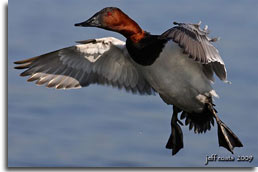All mi

gra
tor
y birds (birds which migrate from wintering areas to summer areas) are governed by the U.S. Fish and Wildlife Service. Hunting regulations (seasons, bag limits, etc.) for migratory game birds are established by the
U.S. Fish and Wildlife Service via the SRC (Service Regulation Committee) with the final rule made by the Director of the U.S. Fish and Wildlife Service.
The SRC conducts three meetings each year with representatives from each of the four Flyway Councils in the U.S. to discuss migratory game bird management regulatory issues. The first meeting is in January to review the status of migratory bird populations and outline anticipated actions for the coming hunting season. The second meeting is held in late June to develop regulations for early seasons (e.g. dove, woodcock, rails, etc.) and discuss proposed regulatory alternatives for duck seasons. The third meeting is held in early August to develop regulations for late seasons (regular duck and goose seasons).
The three scheduled meetings are held to hear the concerns and recommendations of the four flyways and staff recommendations of the U.S. Fish and Wildlife Service Migratory Bird Management Office.
The four flyways are the Atlantic, Mississippi, Central and Pacific. A Flyway Council is made up of one representative from each state and province in the flyway. Flyway Councils meet twice each year (March and July) to provide recommendations for migratory bird management in the Flyway. Flyway Councils have the expertise of flyway technical committees to provide biological foundation for their recommendations. Maryland biologists are part of the Atlantic Flyway Council's Technical Section and thus bring the concerns relating to Maryland conditions and Maryland hunters to the Flyway deliberations.
Two consultants are elected by each Flyway Council to represent them at the SRC meetings. The role of the consultants is to present the Flyway recommendations and to work with other flyways to resolve common issues of national and international importance.
Public attendance is permitted at the SRC meetings, but participation is limited to listening. The public does have the opportunity to comment on all proposed regulations, which are published in the Federal Register, by submitting written comments to the Director of the U.S. Fish and Wildlife Service. All regulations are first published as proposed regulations for comment, usually 30 days prior to final rule.
Specific concerns by Maryland sportsmen and other waterfowl enthusiasts are brought forward by Maryland biologists during the Technical Section Committee meetings as well as by the Maryland representative at Flyway Council meetings. However, majority rule of the Council determines the Flyway's position.
Maryland citizens can voice their opinion on migratory bird issues at any time. Two formal opportunities are provided by the Department of Natural Resources for comment on seasons and bag limits. The first opportunity is at the March hearings (held every other year) when resident game species and early migratory seasons are discussed. The second opportunity is in late August when special waterfowl regulation hearings are conducted.
The Atlantic Flyway Council
The Atlantic Flyway, which Maryland belongs to, includes one representative from each of the following states:
- Connecticut
- Delaware
- Florida
- Georgia
- Maine
- Maryland
- Massachusetts
- New Hampshire
- New Jersey
- New York
- North Carolina
- Pennsylvania
- Rhode Island
- South Carolina
- Vermont
- Virginia
- West Virginia
Also members of the Atlantic Flyway Council are:
- New Brunswick
- New Foundland
- Nova Scotia
- Ontario
- Prince Edward Island
- Puerto Rico
- Quebec
- Virgin Islands